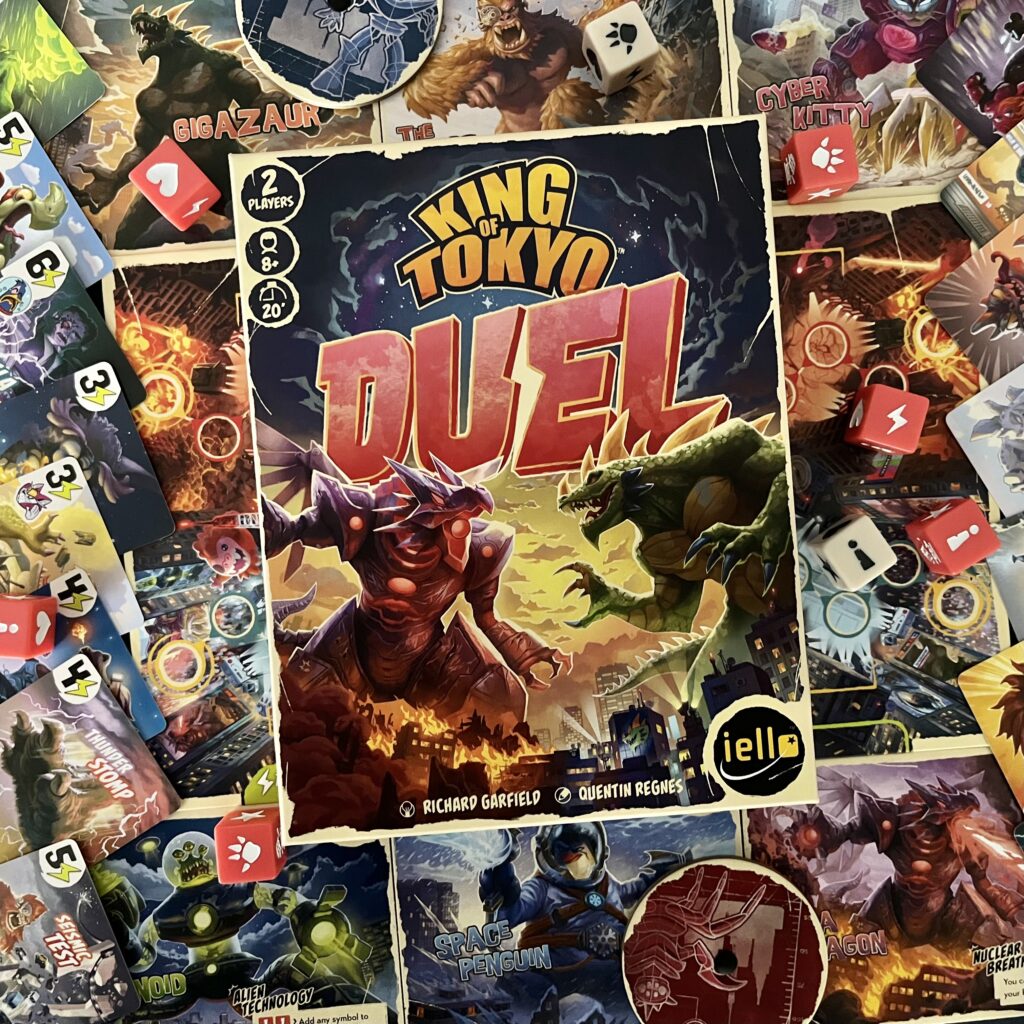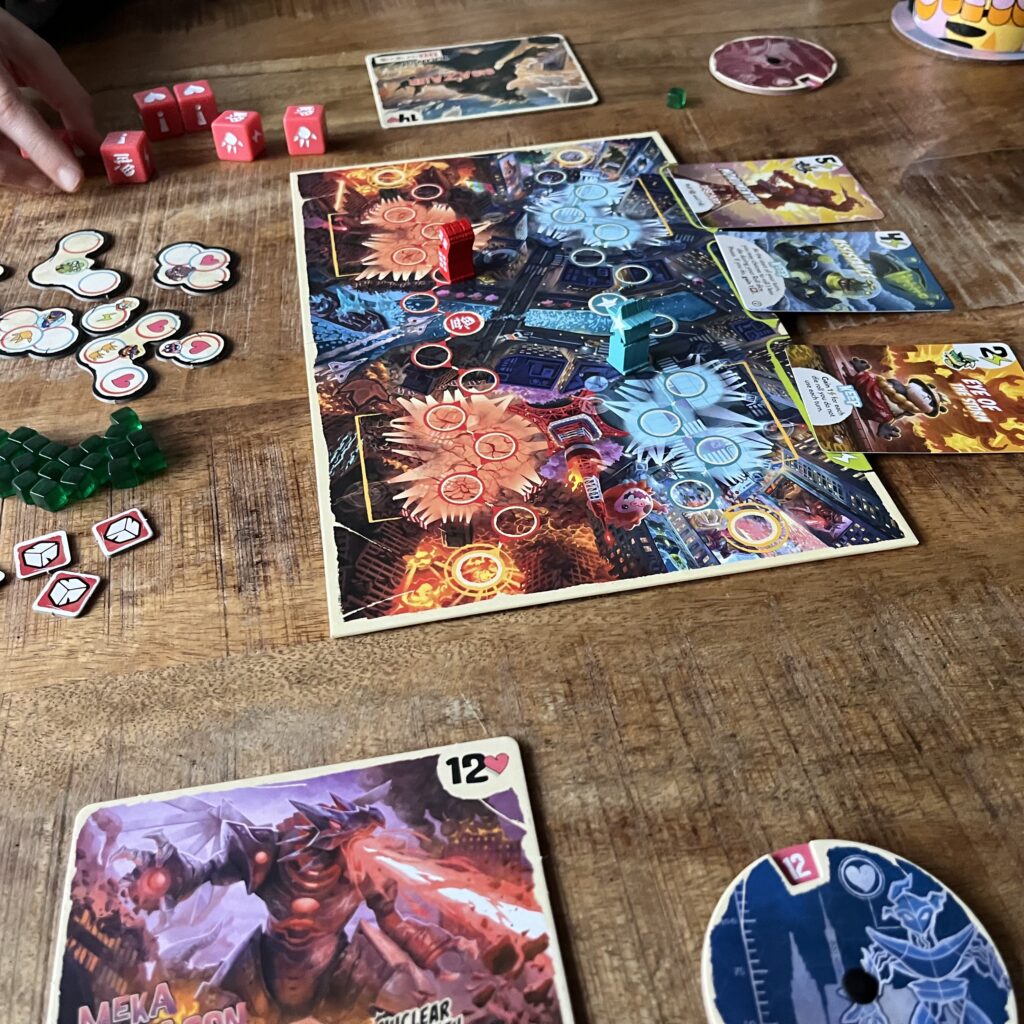For some time kaijus, giant robots, aliens and other monsters have been fighting for control of Tokyo. King of Tokyobood for a large group of monsters the ultimate arena for a round of mating. As you might guess, King of Tokyo Duel is a duel between two monsters. Think King Kong versus Godzilla – but with monsters that skillfully circumvent copyright rules. Although it is only a duel, the fight is bigger than ever, but in Tokyo there is only room for one….
Background
King of Tokyo Duel follows the trend of successful game series aimed at larger groups (such as 7 Wonders, Splendor, Quacks of Kakelenburg and even Cosmic Encounter) that add a dynamic twist to gameplay and focus on two players: the dueling games. Blame the creators, because it’s like hard enough to find 1 co-player, let alone a group. Suits me fine, by the way, because I also prefer to play games 1 against 1.

These Duel games also offer the makers the opportunity to put their games back on the workbench and tinker with the concept. Often with surprising and very successful results. Of Splendor Duel and 7 Wonders Duel, I would firmly claim that these 2-player variants are better games.
A Duel edition of the popular King of Tokyo – of which other variants have already appeared, such as a Dark edition, a cooperative edition and even a simpler Origins edition – has now also been released. A small spoiler for King of TokyoDuel: I personally like it better than its bigger siblings, too. That’s saying quite a bit, by the way, because I dare admit that I am quite a King of Tokyo fanboy.
King of Tokyo is a game that will never leave my collection. It is one of the first larger modern games I bought when I re-entered the hobby. Playing a little silly dice with friends, throwing punches and smashing Tokyo to smithereens. An ideal filler, starter or turn-off during a game night. What about Duel?
Setup and progression
For those who have played King of Tokyo, many parts will seem somewhat familiar, but most parts will be new. At the beginning of the game, players set up the game board and each player chooses a monster. Each monster, by the way, has a unique ability, so Duel has an asymmetrical edge. The multiple monsters and abilities also add variety.
There are two tracks on the board, fame and destruction. A marker is placed on both tracks. If you get both markers in the spotlight area on your side of the board, you win the game. If you get a marker at the very end, you also win the game. To name the last possibility right away: if you deal enough blows to your opponent to bring his lives to zero, you win the game.
A stack of so-called buzz tokens is placed next to the board. These are placed on the tracks on the game board during the game to influence the tracks. Also placed next to the board is a market of cards and the general draw pile. Players can buy these cards during the game for bonuses, special actions and abilities.
Put the dice in reach and players can roll dice. Each turn, a player may roll and/or save dice up to three times (or more often depending on special abilities) just like in Yahtzee. Each symbol has an effect and after the dice are rolled, the symbols are unwound. With paws you can deal blows, with the energy symbol obtain energy cubes to buy cards, with hearts regain life with the exclamation point activate your unique skill with if you roll three or more of the asterisk or the broken skyscraper, you may draw the fame marker or destruction marker towards you on the game board respectively.

After rolling, you may buy cards and if you do not buy cards, you get one free energy cube. after this, it is the other player’s turn until one player reaches a goal.
Conclusion
King of Tokyo contains the same elements that make King of Tokyo a classic, but with some extra dimension and dynamic new game elements. Players have a little more influence over gameplay because of the special abilities and because players can get energy cubes faster to buy cards. An additional fun element are the awards you can get. When players achieve a certain condition, they get to put a sticker on the game box, increasing replayability in a playful way. By the way, due to the amount of monsters and cards, that replayability is pretty much guaranteed.



